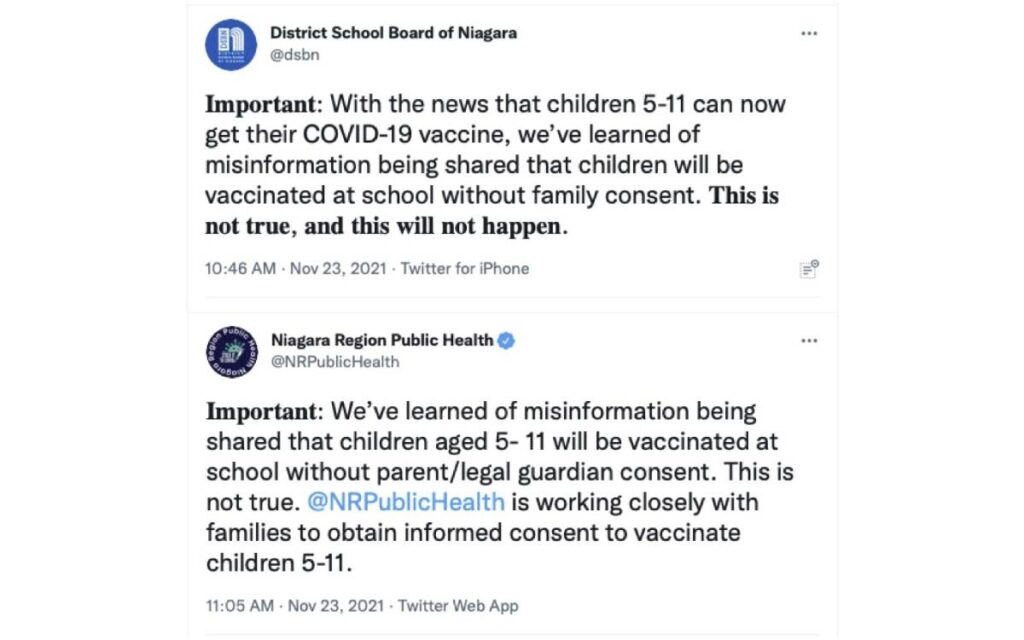
Tweets sent out by the District School Board of Niagara and Niagara Region Public Health on Tuesday, Nov. 23. Both warn of the spread of “misinformation” concerning parental consent for vaccination at schools.
Just as Ontario parents got the go-ahead to book vaccinations for youth under 12 on Tuesday, the District School Board of Niagara (DSBN) posted a warning to social media that read: “Important: With the news that children 5-11 can now get their COVID-19 vaccine, we’ve learned of misinformation being shared that children will be vaccinated at school without family consent. This is not true, and this will not happen.”
The post was followed up by a similar message from Niagara Region Public Health less than 20 minutes later, warning people about “misinformation” regarding vaccination consent for schoolchildren aged 5-11.
For its part, the St. Catharines Standard then reported on the alleged spread of “misinformation” later that day. The Ottawa Citizen even made mention of it in a story.
But where, exactly, did people get the idea that Niagara schools could or would vaccinate children aged 5-11 without parental consent?
The answer: Niagara Region Public Health.
On its website, Niagara Region Public Health has a section under ‘Child Vaccinations’ entitled ‘School Vaccination Information for Parents, Legal Guardians and School Administration’. Under the heading ‘Age of vaccination consent’, there is a passage that reads: “Under the Health Care Consent Act, be advised that there is no minimum age to provide consent. This means that your child can consent to be vaccinated without parental consent.”
It seems then that those spreading “misinformation” did not take their initial cues from some fringe anti-vax site on the outer reaches of the dark web. Rather, they made a reasonable inference from limited information supplied by the precise source one would be prudent and expected to consult.
However, despite the information being sourced directly from its own website, Niagara Region Public Health said that the claims being circulated online were all not true and, according to the organization, were deemed “misinformation”, in essence, due to the affinities and preferences of the people spreading the ideas.
“Many of the persons online who were propagating this information were persons who had declared being opposed to vaccination against COVID-19 generally,” Courtney Westerhof, Public Health Communications Consultant said in an email, “hence we believe this was misinformation being used to confuse parents rather than share legitimate concerns.”
Yet, Niagara Region Public Health evidently thought its passage incomplete or misleading enough in isolation to first add an information box directing users to a page dedicated to discussing vaccination for children, before then amending said information box to explicitly say the agency “requires parental/guardian consent for children five to 11 years of age for the COVID-19 vaccine.”
“Our website is constantly being updated to provide the public with the most clear, up-to-date information,” said Westerhof. “We have also been working to share the messaging through multiple channels around the need for parental/guardian consent as it pertains to the COVID-19 vaccination for children 5-11 years old given misinformation by a few has now created confusion among many parents.”
But why did Niagara Region Public Health not just change the original quotation when it apparently determined – based on its actions (i.e., adding an information box) – that the passage may be misleading for some readers?
It’s because informed consent is a murky legal concept that, technically speaking, does not contain strict age parameters.
“There is no minimum AGE for consent to treatment in Ontario,” attorney Anita Szigeti told The Niagara Independent on Thursday. “However, there is a requirement to get informed consent from a capable patient/person. Capacity requires the person to understand the information necessary to make the decision and to appreciate the foreseeable consequences. Informed consent must relate to the treatment and be given voluntarily, among other things.”
While it’s discussed in a separate drop-down box below the controversy-stirring passage, as well as at length on the aforementioned dedicated page to COVID-19 vaccination in youth elsewhere on the Region’s site, nowhere in the original quotation on the general school vaccination page did Public Health mention soliciting the necessary informed consent from children.
Szigeti, who literally wrote the book on consent and capacity law in Ontario, said that while children can theoretically provide informed consent, it’s unlikely that young children on the lower end of the age range in question would be considered in possession of the necessary capacity to legally do so.
“In practical terms while there may be 11 year olds who are capable to consent to or refuse the vaccine for COVID-19, it is significantly less likely that a five year old would have the requisite capacity, although it’s theoretically possible,” said Szigeti.
“In law, the decision about who consents would have to be made on a case-by-case basis. The physician proposing the treatment makes the decision. That all being said, I would expect most health practitioners would require parental consent for this age group.”
Of course, as it later clarified, Niagara Region Public Health understands this well and does and will require parental/guardian consent for children aged 5-11 to get the COVID-19 vaccine.
Schools, moreover, will not vaccinate students under 12 without the consent of a substitute decision maker.
However, it should be said, the notion that schools would or could possibly do so was not the product of wild falsehoods simply plucked from the ether. Rather, the notion appears to have originated from reasonable inferences made based on incomplete, difficult-to-interpret information provided by Niagara Region Public Health itself.






